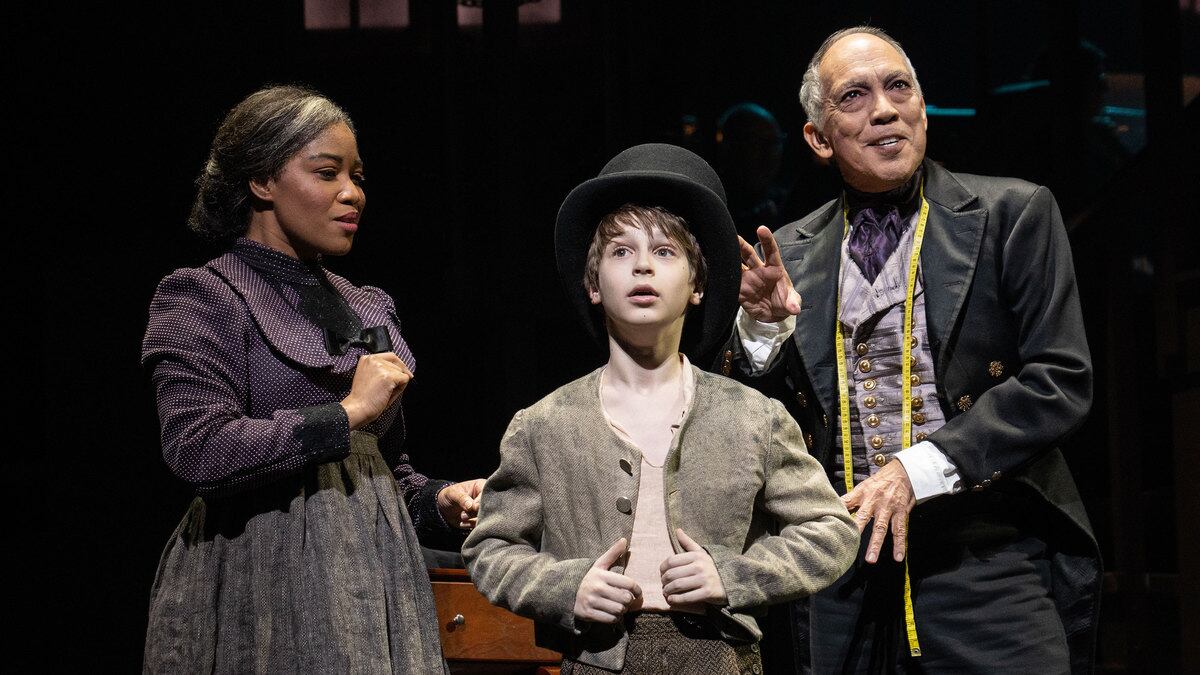It would be wrong to say “a star is born” when it comes to Benjamin Pajak. The star of the Encores!’ production of Oliver! (New York City Center, to May 14) may only be 12, but he already has a sterling Broadway credit to his name, as a charming scene-stealer in The Music Man. But wait till you hear “Where Is Love?” as sung by Pajak, Oliver’s cri-de-coeur and plaintive question to the universe around him.
A young orphan, who is terribly abused and whose foggy parentage is the plot’s major mystery, his is not simply a song of victimhood. Oliver scrappily stands up to all the villains around him, as he tries to find—against a background of workhouses and venal exploiters—some kind of happiness and security. “Where is love?” is a genuine question, a both sweet-voiced and disbelieving interrogation of unseen forces, Oliver claiming love for his own as something he deserves as much as wants. If only the show burrowed into that questing, determined personality more.
Pajak sings the song so well—you can get a taste of how much with this Playbill rehearsal video—it almost brings the show to a standstill. There are other moments like this in Lear deBessonet’s production (deBessonet is also artistic director of Encores!)—familiar crowd-pleasing numbers sung with gusto by Pajak and the whole cast. But there are other moments that jar. And then there is the musical itself, whose themes and tonal shifts and characterizations seem even more queasy and weird in 2023. Oliver! is a curious beast that sometimes zings with old-fashioned musical theater pizazz and sometimes feels less sure about what it is showing, and even less sure in what it is saying about what it is showing.
Still, there is excitement about this show. Think about Encores!’ present garland-laureled, transfer-to-Broadway strike rate. Into the Woods and Parade, which both began life under the same revival-of-old-classics umbrella at City Center, have 14 Tony nominations between them this year. Given Oliver!’s basket-overfloweth list of toe-tappers, it should feel like a shoo-in for the next Broadway transfer.
Maybe it will. The achievement of mounting Oliver! in such a short space of time for a two-week run is an impressive feat in itself. This is not merely a concert-sung route through famous tunes, but a fully staged production, with dazzling choreography by Lorin Latarro, and Mary-Mitchell Campbell conducting a bracing, note-perfect orchestra. The problem is the story, and the smiles intended to be elicited by wonderful songs like “Food, Glorious Food,” which really is about child hunger and exploitation—the uniformly excellent young person’s chorus holding aloft bowls and clutching their empty tummies desperately.

Benjamn Pajak, left, and Raúl Esparza in 'Oliver!.'
Joan MarcusOliver himself is physically and verbally abused by every adult he comes into contact with early on, but the musical and book are not really interested in interrogating what this means. The cruelty is a comical and musical means to an end, but today it is impossible to watch what he goes through without that being informed by a modern awareness of child exploitation (economic and sexual), child trafficking, and child abuse. Just because these things may have been unquestionably embedded in the time of Dickens, on whose novel the musical is based, does not mean they translate so easily to now.
Lionel Bart’s musical, first performed in Britain in 1960 and New York three years later, also shows its age with Nancy, Bill Sikes’ (Tam Mutu) abused girlfriend. Lilli Cooper plays her with formidable heart and voice in this show, but her big torch song, “As Long as He Needs Me,” which lays out why she will never betray the appalling Sikes, today—no matter how commandingly Cooper nails it—echoes as something sung by a terrified and gaslit victim of abuse.
In 2023 terms, Nancy is a victim of coercive control, and her famous song is a perverse hymn to her suffering of the same, and applauding it feels bizarre, no matter how well Cooper sells it. Mutu is a no-joke, chilling Sikes; the stage flushed with apposite devilish red light when he appears. However, when it comes to his and Nancy’s deaths, the challenge of staging the show so fast is humorously visible; air is stabbed around Nancy, while Sikes falls winsomely off stage from a gunshot. (The best stage death in the show sees a character make a humorous point of how impossible it is to die and disappear easily, moving off stage like a retreating crab.)
Brad Oscar and Mary Testa as Mr. Bumble and Widow Corney (in the poorhouse), and Thom Sesma and Rashidra Scott as Mr. and Mrs. Sowerby (as undertakers), play Oliver’s early adult tormenters with comic zeal, but suffer with a book that jettisons them too quickly. Oliver himself is strangely de-centered as the show goes on; often sighted but not that heard. He becomes his own cypher, acted upon, searched for, held both affectionately and hostilely, yet rendered weirdly voiceless as the show continues.
The fact that Fagin, played with an off-kilter charm and shiftiness by Raúl Esparza, is both exploiting all the boys under his charge, as well as aiming to be a paternalistic carer feels plain odd, no matter how well Esparza sings and acts his role. Who is Fagin, and what is his sphere and division of TLC and exploitation? What is his special interest in Oliver based on? It feels both creepy and heartfelt. The whole musical is like this—you wonder at its lack of inquiry and depth, and as you do so it dazzles you with another of its cheery, beautifully performed ear-worm songs, like “Consider Yourself,” “Oom-Pah-Pah,” and “I’d Do Anything”—and quickly you are delighted again. How did they pull this together in so few days, and still throw in stage acrobatics and touches like using parasols for carriage wheels? Fantastic!
How does Oliver! solve its staging and narrative problems? A bit of editing would help—one ponderously played scene with Fagin contemplating his stash of jewels seemed without end. If Oliver!’s passage to Broadway continues, it may face other creative decisions around what it shows and how it shows it. This seems a trickier task, because how do you reorient, and indeed should you, Oliver!’s mixture of dazzle and deeply troubling? What do you lean into and lean away from? Oliver! is a theatrical puzzle, asking its audience to enjoy its spectacle—and not ask too much about its darkness.







